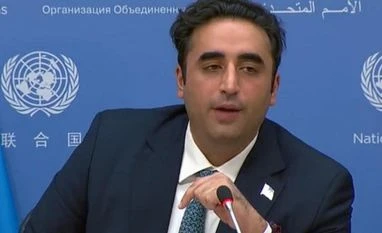Pakistan Foreign Minister Bilawal Bhutto-Zardari has said that deposed prime minister Imran Khan is not against the army's interference in politics but is upset with the powerful establishment only because it is no longer supporting him, according to a media report.
"Khan's problem with the Pakistan Army began in April of last year when it declared that it would not get involved in politics and would not take sides, Bilawal told Qatar-based Al Jazeera news channel on Saturday.
The Pakistan Tehreek-e-Insaf chairman's issue with the army is not that they're involved in politics; his problem with the army is they're not getting involved to support him, he said.
Bilawal said that the role of the army in Pakistan's politics cannot be denied. "More than half of our history has been covered by military rule. My party, the Pakistan Peoples Party, has challenged each and every single dictatorship in Pakistan's history."
He said Khan, however, supported every dictatorship in Pakistan, including the last dictatorship of former president General (retd) Pervez Musharraf.
"Khan's political history is that he has supported every dictator and he supported every autocrat in Pakistan's history, he said.
The foreign minister said that former-cricketer-turned politician's rise to power in 2018 is well-documented. "It is an established fact that he was brought into power through a rigged election in collaboration with some former officers of the Pakistan Army."
Responding to a question about the army's popularity after May 9 events, Bilawal said the majority of the people of the country want the army to remain apolitical.
"As far as the army's popularity as an institution is concerned, the PTI supporters may be upset with the Pakistan Army for not violating the Constitution and supporting Khan, he said.
More From This Section
He said the majority of Pakistanis are deeply offended by the actions that took place on May 9 where Khan encouraged his supporters to attack army installations.
"The Corp Commander House in Lahore, the GHQ [General Headquarters] in Rawalpindi and many military installations [were targeted]. Such an attack has never been carried out by any political party in the history of Pakistan and now those who were involved in these attacks on our military installations must face the consequences of the law of the land, he added.
Bilawal said his party does not believe change can come by attacking military institutions but rather by strengthening democracy.
"The only way that change can come would be with democratic forces and civilian institutions such as parliament to take their place within Pakistani society and exert themselves, he added.
Bilawal said Khan paid very little attention to parliament when he was the prime minister.
"When he should have been the leader of the opposition, he left parliament. The fate of Pakistan can't be decided on the streets. It has to be decided by parliament and that is the only way Pakistani democracy can be strengthened when civilians take their own space it will ease the army out of politics, he said.
He said the only person to be blamed for Khan's downfall is Khan himself. History will prove that this is the case, he said.
Bilawal also expressed his disappointment with the interim government of Afghanistan, saying Pakistan and the international community had high expectations from the new regime.
While they have made some progress in certain areas, there is still a long way to go in many others, he said, adding that Pakistan's position on Afghanistan aligns with that of the international community.
The foreign minister said Pakistan was witnessing a quantitative increase in terrorist attacks since the fall of Kabul in August 2021.
"You are absolutely right to point out the security threat we face from terrorist organisations, particularly the Tehreek-e-Taliban Pakistan (TTP).
Bilawal said meetings have taken place with the Iranian foreign minister as well as trilateral meetings involving China, Pakistan, and Afghanistan. The key message from these engagements has been the need for specific action against terrorist groups, he added.
To a question about Pakistan's relations with China, Bilawal said: "We have actively engaged with China over the years and have established an all-weather strategic partnership.
Through initiatives such as the USD 60 billion China-Pakistan Economic Corridor (CPEC), he said, Pakistan has made significant developments in energy infrastructure, communication infrastructure, and port infrastructure.
)